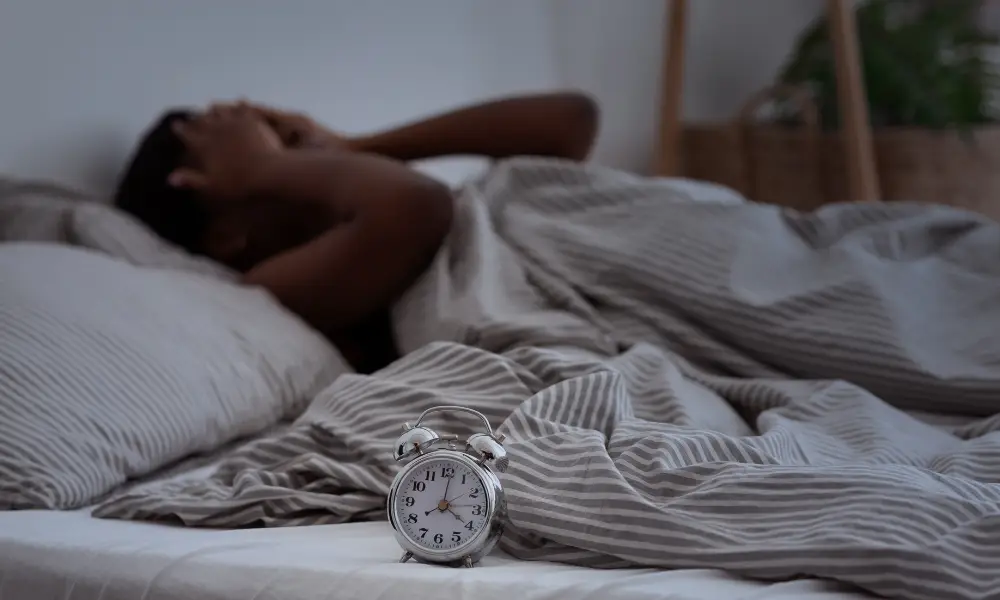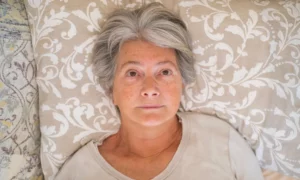Insomnia during menopause is a common yet often overlooked aspect of this significant life transition. As women enter the menopausal phase, hormonal fluctuations, aging-related sleep changes, and psychological factors can collectively contribute to disruptive sleep patterns. In this article, we will talk about the complexities of menopause insomnia and provide practical insights and solutions to help women navigate this challenging period.
Contents
How Does Menopause Affect Your Sleep? 
Menopause can significantly impact sleep due to hormonal changes and associated symptoms. The decline in estrogen levels during menopause affects various aspects of sleep, leading to disruptions in sleep patterns. Here’s how menopause can affect sleep:
- Hot Flashes and Night Sweats
- Hormonal fluctuations, particularly a decrease in estrogen, can lead to hot flashes and night sweats.
- Sudden episodes of intense heat can cause night awakenings, disrupting the sleep cycle.
- Hormonal Changes
- Estrogen plays a role in regulating sleep, and its decline during menopause can affect sleep-wake cycles.
- Changes in progesterone levels can also contribute to sleep disturbances.
- Insomnia
- Menopausal women may experience difficulty falling asleep or staying asleep.
- Insomnia can result from hormonal fluctuations, night sweats, or psychological factors related to the menopausal transition.
- Sleep Apnea Risk
- The risk of sleep apnea may increase during menopause, potentially due to changes in body composition and hormonal fluctuations.
- Mood Changes
- Menopause is associated with mood swings, anxiety, and depression, which can impact sleep.
- Emotional factors may contribute to difficulty falling asleep or staying asleep.
- Disrupted Sleep Architecture
- Menopause can alter the structure of sleep, leading to changes in the proportion of different sleep stages.
- Less time spent in deep, restorative sleep may contribute to feelings of fatigue.
- Decreased Melatonin Production
- Melatonin, a hormone that regulates sleep-wake cycles, may decrease during menopause.
- Lower melatonin levels can contribute to difficulty falling asleep and disrupted sleep patterns.
- Increased Stress
- The menopausal transition can be a stressful period for some women, and stress can negatively impact sleep.
- Elevated stress levels may contribute to insomnia and overall sleep disturbances.
When Should You Seek Professional Help?
Seeking guidance from a healthcare professional is recommended when the symptoms of menopause, including insomnia, have a notable impact on daily life and overall well-being. The following scenarios indicate when it is appropriate to consult with a professional:
- Persistent Sleep Disturbances
If your insomnia persists for more than a few weeks and begins to impact your daily functioning, it’s time to seek professional help.
- Worsening Symptoms
If your insomnia symptoms are worsening over time or if you notice additional symptoms like fatigue, irritability, difficulty concentrating, or mood changes, seeking professional guidance is important.
- Underlying Health Concerns
If you have underlying health conditions, such as cardiovascular issues, diabetes, or a history of mental health disorders, it’s important to consult a healthcare professional to ensure that your insomnia is appropriately managed within the context of your overall health.
- Safety Concerns
If insomnia is leading to safety concerns, such as impaired performance while driving or operating machinery, it’s crucial to address the issue promptly.
- Impact on Mental Health
If insomnia is contributing to or exacerbating mental health concerns such as anxiety or depression, seeking professional help is essential. Insomnia and mental health often have a bidirectional relationship, and addressing one can positively impact the other.
- Failed Self-Help Strategies
If you’ve tried self-help strategies, such as improving sleep hygiene, making lifestyle changes, or using over-the-counter sleep aids, without significant improvement, it’s time to involve a healthcare professional for a more comprehensive approach.
- Concerns about Hormonal Changes
If you suspect that hormonal changes associated with menopause are contributing to your insomnia, consulting with a healthcare professional, such as a gynecologist or endocrinologist, can help explore hormonal treatment options.
Remember that healthcare professionals, such as primary care physicians, gynecologists, or sleep specialists, can provide personalized guidance based on your specific health history and symptoms.
How Is Insomnia Treated During Menopause? 
Insomnia during menopause can be challenging, but there are various approaches to address and manage it. It’s important to note that individual responses to treatments may vary, and it’s advisable to consult with a healthcare professional for personalized advice. Here’s a detailed explanation of how insomnia during menopause can be treated:
Hormone Replacement Therapy (HRT)
- Hormone therapy, specifically estrogen and progesterone, is often prescribed to manage menopausal symptoms, including insomnia.
- HRT helps regulate hormonal imbalances that can contribute to sleep disturbances during menopause.
Cognitive Behavioral Therapy for Insomnia (CBT-I)
- CBT-I is a structured program that addresses the thoughts, beliefs, and behaviours that contribute to insomnia.
- It involves techniques such as sleep restriction, stimulus control, and cognitive restructuring to improve sleep quality.
Lifestyle Changes
- Sleep Hygiene: Establishing good sleep hygiene practices is crucial. This includes maintaining a consistent sleep schedule, creating a comfortable sleep environment, and avoiding stimulants close to bedtime.
- Regular Exercise: Engaging in regular physical activity can improve sleep quality. However, it’s advisable to avoid intense exercise close to bedtime.
Dietary Changes
- Avoiding Stimulants: Limiting or avoiding caffeine and nicotine, especially in the evening, can help improve sleep.
- Balanced Diet: Maintaining a healthy, well-balanced diet contributes to overall well-being, which can positively impact sleep.
Relaxation Techniques
- Mindfulness and Meditation: Practices such as mindfulness meditation and deep-breathing exercises can help calm the mind and promote relaxation before bedtime.
- Progressive Muscle Relaxation (PMR): This technique involves systematically tensing and then relaxing different muscle groups to alleviate physical tension.
Over-the-counter (OTC) or Prescription Sleep Aids
- Short-term use of over-the-counter sleep aids containing ingredients like diphenhydramine may be considered.
- In severe cases, doctors may prescribe prescription medications, such as certain benzodiazepines or non-benzodiazepine hypnotics. However, healthcare providers should carefully monitor their use due to potential side effects and dependency issues.
Alternative Therapies
- Herbal Supplements: Some women find relief from insomnia with herbal remedies like valerian root, chamomile, or melatonin. However, their efficacy varies, and it’s essential to consult with a healthcare provider before using them.
Psychotherapy
- Addressing psychological factors contributing to insomnia through therapy, such as stress, anxiety, or depression, can be beneficial.
Continuous Monitoring and Adjustments
- Regular follow-ups with a healthcare provider are essential to monitor the effectiveness of the chosen treatment plan and make adjustments as needed.
It’s important to recognize that individual responses to treatments vary, and a combination of approaches may be necessary. Consulting with a healthcare professional ensures a tailored approach that considers individual health history and preferences.
Conclusion
Menopause insomnia is a complex issue that requires a comprehensive approach. By understanding the interplay of hormonal changes, age-related sleep challenges, and psychological factors, women can take proactive steps to improve their sleep quality. From lifestyle modifications to alternative therapies and medical interventions, there are various strategies available to address menopause-related insomnia and promote overall well-being.
If you are facing menopause related issues, menopause treatment at HerMantra can help. Book your free trial online menopause treatment session now.




